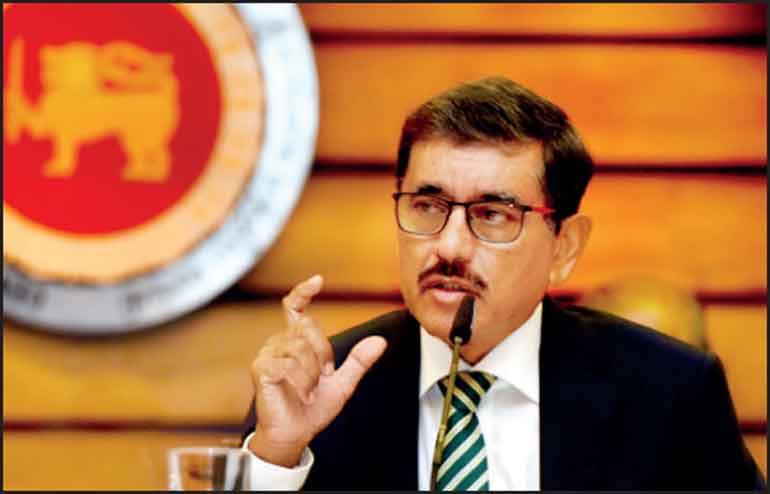Wednesday Feb 18, 2026
Wednesday Feb 18, 2026
Wednesday, 6 March 2024 00:34 - - {{hitsCtrl.values.hits}}

Central Bank Governor Dr. Nandalal Weerasinghe
The Central Bank came under fire from Members of Parliament yesterday when officials of the monetary regulatory authority were summoned to justify the controversial decision regarding the significant salary hike for its employees.
During the Party Leaders’ meeting convened on the matter, MPs voiced their discontent over the move, labelling it as a violation of the law. Separately the CBSL matter was taken up before the Committee of Public Finance (CoPF).
MPs argued that the Central Bank lacked the legal authority to unilaterally raise its staff salaries without prior approval from Parliament, adding that this decision has resulted in an additional monthly expenditure of Rs. 232 million.
MPs also criticised the moral integrity of the Central Bank, highlighting the contradiction of increasing its employees’ salaries, whilst introducing policies that hike taxes such as PAYE and VAT for other segments of the workforce.
Raising concerns about a potential brain drain, MPs claimed that the issue extends beyond the Central Bank, citing that professionals across various sectors were contemplating leaving the country due to economic pressures. The MPs urged for parity, suggesting that if the Central Bank staff received raises, then similar adjustments should be made for university lecturers, doctors and medical professionals, among others.
In response, Central Bank Governor Dr. Nandalal Weerasinghe defended the salary hikes, citing provisions within the Central Bank Act empower the institution to determine and adjust salaries as necessary. He also underscored that these provisions were not only present in previous legislation, but also in the current law.
Despite the President’s directive to the Central Bank when they were summoned before the Cabinet of Ministers on Monday to include trade union representatives in the meeting, their participation was reportedly denied by the Committee on Public Finance (CoPF).
Key officials from the Central Bank, along with representatives from the Attorney General’s Department, Auditor General’s Department, Finance Ministry, and around 20 MPs, were present at the CoPF session to address the issue.
Separately during the Parliamentary session yesterday, Dr. Charitha Herath raised concerns about the legitimacy of the purported three-year collective agreement of the Central Bank, pointing out that it has not been approved by the Labour Ministry and considering it a mere document.
Emphasising the uncontrollable autonomy of the Central Bank, he also insisted on the urgent need for amendments to the Central Bank Act.
MP Dayasiri Jayasekara criticised the Central Bank officials, accusing them of serving their own interests while penalising others with their powers.
He highlighted the disparity in interest rates, noting that Central Bank employees enjoy rates as low as 1% whilst the general public faces rates as high as 20.5%.
Adding to the heated discussion, MP Suresh Raghavan issued a stark warning, suggesting that if there were to be another wave of public unrest akin to the Aragalaya movement, bureaucrats’ houses would be targeted instead of politicians’.
Separately during the post-Cabinet meeting briefing yesterday morning Co-Spokesman and Minister Bandula Gunawardana said the Cabinet of Ministers directed the Parliament to address the issue of steep salary hikes at the Central Bank, citing it as a matter within the jurisdiction of the legislative branch.
He highlighted that Central Bank officials were summoned before the Cabinet on Monday, where they elaborated on the rationale behind the decision to raise staff salaries.
“They (CBSL officials) clarified the salary adjustments were made following the institution’s tradition and aligned with the triennial Collective Agreement entered into with the Trade Unions covering the period 2024-2026. Considering it a matter within the legislative branch’s jurisdiction, the President directed the CBSL to clarify the matter before Parliament, as the institution is now obligated to justify its actions to the legislature,” Gunawardena said.
The Cabinet Co-Spokesman also said that the CBSL officials underscored the necessity of offering competitive salaries to retain skilled personnel, citing the high likelihood of staff moving to the private sector, particularly banks, in pursuit of higher wages. To prevent such walking out and maintain financial sector stability, the CBSL opted to increase salaries.
The decision to implement steep salary hikes for CBSL staff sparked concerns amid debates over the autonomy of the Central Bank and the implications of recent legislative changes.
Acknowledging that some aspects of Cabinet discussions are confidential, Gunawardana noted that several Ministers expressed their opinions on the matter.
Responding to queries about the disparity in wages between CBSL office assistants and Ministers, Gunawardana said that Parliament should address the issue, taking into account union demands and other relevant factors.
“The CBSL officials explained the decision was partly because of the trade unions and other demands. Hence, the President asked them to take the representatives of the trade unions as well to the Parliamentary inquiry,” he said.